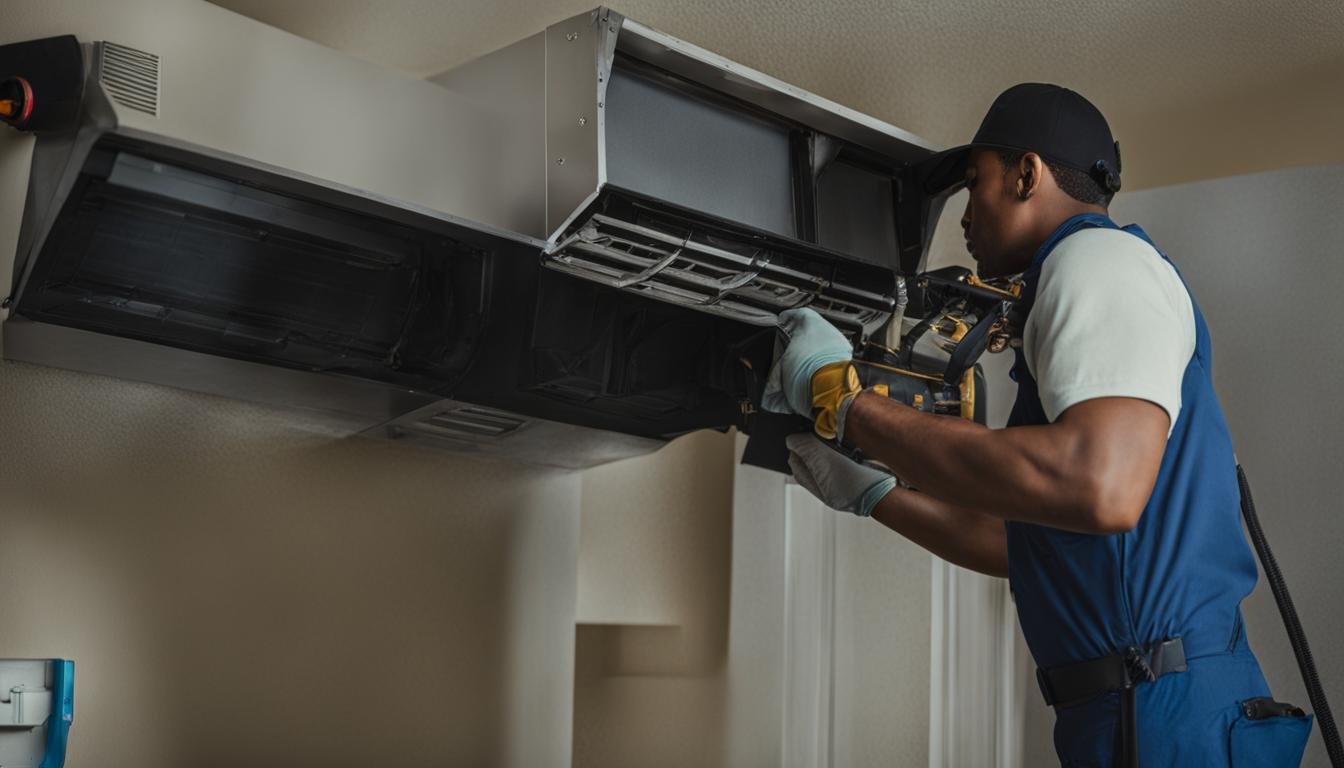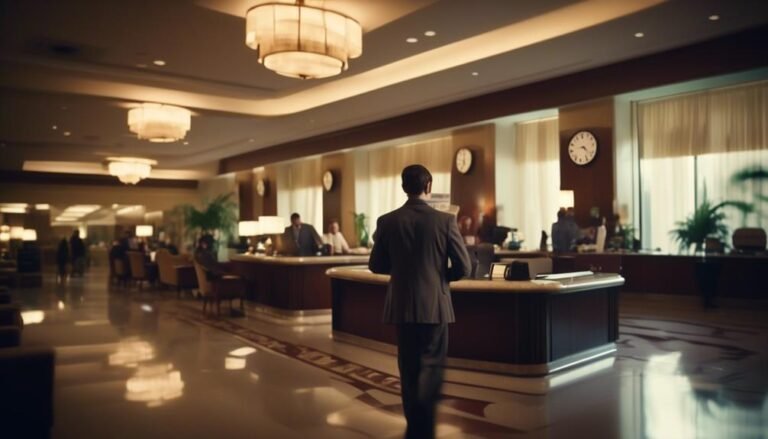Understanding Best Practices in Hotel Maintenance and Repairs
Hotel maintenance is a crucial aspect of running a hotel, as it involves keeping every part of the property in good condition. From refrigerators to elevators, cable TV to phone lines, computers to furniture, and lighting, effective maintenance management ensures seamless operations and cost savings.
Establishing standard operating procedures, utilizing maintenance management software, and implementing a daily maintenance checklist are all essential best practices in hotel maintenance management. By following these practices, hotels can ensure efficient operations, guest satisfaction, and the longevity of their properties.
Key Takeaways:
- Hotel maintenance is essential for seamless operations and cost savings.
- Effective maintenance management includes establishing standard operating procedures, using maintenance management software, and implementing a daily maintenance checklist.
- Hotel maintenance can be categorized into preventive maintenance and reactive maintenance.
- Proper maintenance management leads to improved guest satisfaction and increased revenue.
- Hotel maintenance tasks can be effectively managed with checklists, schedules, and updated maintenance logs.
What is Hotel Maintenance?
Hotel maintenance refers to the work undertaken to keep, restore, or improve every part of a hotel. It includes tasks like repairing or replacing broken assets to reduce the risk of interruptions in running the hotel. Hotel maintenance management plays a vital role in ensuring the smooth functioning of a hotel by overseeing the maintenance tasks and ensuring that necessary repairs or replacements are done in a timely manner.
Effective hotel maintenance management is critical for preventing issues that can disrupt hotel operations. By addressing maintenance needs promptly, hotels can minimize downtime, ensure guest satisfaction, and protect their assets. Maintenance tasks may range from fixing plumbing issues and electrical faults to maintaining HVAC systems and servicing kitchen equipment.
Interruptions in running a hotel can adversely affect guest experiences and the hotel’s reputation. It is essential to proactively manage hotel maintenance to identify potential issues before they escalate. This involves regular inspections, routine maintenance checks, and prompt action when repairs are needed. By prioritizing hotel maintenance, hotel owners can create a safe and comfortable environment for their guests while also protecting their investment.
Types of Hotel Maintenance
Hotel maintenance can be broadly categorized into two types – preventive maintenance and reactive maintenance. Both types play a crucial role in ensuring the optimal functioning of hotel assets and reducing the risk of interruptions in hotel operations.
Preventive Maintenance
Preventive maintenance involves regular and routine upkeep activities to prevent unexpected failures or breakages of hotel assets. It focuses on identifying and addressing potential issues before they turn into major problems. By implementing a preventive maintenance plan, hotels can extend the lifespan of their assets, enhance guest satisfaction, and minimize operational disruptions.
Examples of preventive maintenance tasks include regular inspections, cleaning, lubricating, and replacing parts or components before they fail. These proactive measures help in identifying areas that require attention and taking necessary actions to prevent costly breakdowns. Preventive maintenance is essential in maintaining the overall condition and functionality of hotel assets, ensuring a smooth and uninterrupted guest experience.
Reactive Maintenance
Reactive maintenance, also known as corrective maintenance, involves repairing broken assets after they have already failed. This type of maintenance is primarily focused on restoring operations and resolving immediate issues. While reactive maintenance is generally more expensive and time-consuming than preventive maintenance, it is often unavoidable when unexpected breakdowns occur.
Examples of reactive maintenance tasks include repairing malfunctioning equipment, fixing plumbing issues, or replacing damaged furniture. Reactive maintenance is essential for addressing urgent matters and minimizing downtime caused by asset failures. However, relying solely on reactive maintenance can lead to higher costs, guest dissatisfaction, and a higher risk of operational disruptions.
| Maintenance Type | Definition |
|---|---|
| Preventive Maintenance | Regular and routine upkeep activities to prevent unexpected failures or breakages of hotel assets. |
| Reactive Maintenance | Repairing broken assets after they have already failed, focusing on restoring operations and resolving immediate issues. |
Both preventive and reactive maintenance have their own importance in maintaining the efficiency and functionality of hotel assets. While preventive maintenance helps in avoiding costly breakdowns and extending asset lifespan, reactive maintenance addresses immediate issues and restores operations when failures occur. A well-balanced maintenance strategy that incorporates both types can ensure seamless operations, enhance guest satisfaction, and optimize cost-efficiency in the hotel industry.
The Importance of Hotel Maintenance
Hotel maintenance is of utmost importance in the hotel industry. Effective maintenance management ensures that all activities behind the scenes are in order, allowing for seamless operations and enhanced guest satisfaction. Additionally, proper maintenance practices contribute to increased revenue and help hotels avoid potential losses due to damaged rooms or facilities.
One of the key benefits of hotel maintenance management is the prevention of unexpected outages and delays. By implementing regular maintenance procedures, hotels can identify and address potential issues before they escalate into major problems. This proactive approach minimizes disruptions to guests and ensures that all facilities and assets are functioning optimally.
Effective hotel maintenance management is crucial for the hotel industry. It ensures that all the activities behind the scenes are in order and work seamlessly, leading to improved guest satisfaction and increased revenue.
Maximizing Revenue Potential
Proper maintenance management also plays a significant role in maximizing revenue potential. When all facilities and assets are well-maintained, hotels can attract more guests and charge premium rates. Guests are more likely to choose a hotel that looks well-maintained and offers a pleasant experience. In contrast, a hotel with visible signs of neglect may struggle to attract guests and may need to lower its prices to remain competitive.
By prioritizing and efficiently carrying out maintenance tasks, hotels can maximize their revenue by ensuring that all rooms and facilities are in top condition. Additionally, regular maintenance helps prolong the lifespan of assets, reducing the need for frequent replacements and saving costs in the long run.
Enhancing Guest Satisfaction
Guest satisfaction is a top priority for any hotel. Proper maintenance management directly contributes to guest satisfaction by providing a pleasant and comfortable environment. When everything is in working order, guests are more likely to have a positive experience and leave positive reviews. On the other hand, maintenance issues such as broken fixtures or faulty equipment can lead to guest dissatisfaction and negative reviews.
Well-maintained facilities also promote guest safety and security, further enhancing their overall satisfaction. By promptly addressing maintenance needs and ensuring that everything is in good condition, hotels create a positive impression and build a loyal customer base.
| Benefits of Hotel Maintenance | Hotel Industry | Revenue | Guest Satisfaction |
|---|---|---|---|
| Prevents unexpected outages and delays | Attracts more guests | Maximizes revenue potential | Creates a positive guest experience |
| Reduces the risk of revenue losses | Helps charge premium rates | Prolongs asset lifespan | Enhances guest safety and security |
Establish Standard Operating Procedures (SOPs)
Standard Operating Procedures (SOPs) are fundamental to effective hotel maintenance management. SOPs provide step-by-step instructions for carrying out maintenance tasks, ensuring consistency, efficiency, and quality in the maintenance operations. By implementing SOPs, hotels can enhance their maintenance practices and streamline their processes.
An SOP can cover a wide range of maintenance activities, from routine tasks like changing light bulbs to more complex repairs. These procedures help maintenance staff understand the expectations and standards for each task, ensuring that nothing is overlooked or skipped. SOPs also enable new employees to quickly adapt and become proficient in their roles, reducing the learning curve and improving productivity.
When creating SOPs, it’s important to involve the maintenance team, as they are the ones performing the tasks. By seeking their input and feedback, hotels can develop comprehensive and practical procedures that address the specific needs of their property. Regularly reviewing and updating SOPs is also essential, as it allows for continuous improvement and adaptation to changing maintenance requirements.
“Standard Operating Procedures are the backbone of a well-executed maintenance strategy. They provide clarity and guidance for maintenance staff, ensuring that tasks are carried out consistently and efficiently.”
Benefits of implementing SOPs in hotel maintenance
- Consistency: SOPs establish consistent procedures and standards, ensuring that maintenance tasks are executed in a uniform manner across the property.
- Efficiency: By providing clear instructions and guidelines, SOPs help maintenance staff complete tasks more efficiently, reducing the time and effort required.
- Quality: SOPs outline best practices and quality standards, enabling hotels to maintain a high level of workmanship and deliver exceptional guest experiences.
- Safety: SOPs include safety protocols and precautions, minimizing the risk of accidents or injuries during maintenance activities.
- Training and Onboarding: SOPs serve as valuable training resources for new hires, facilitating their integration into the maintenance team and ensuring consistency in performance.
| Benefits of implementing SOPs in hotel maintenance | Consistency | Efficiency | Quality | Safety | Training and Onboarding |
|---|---|---|---|---|---|
| Description | SOPs establish consistent procedures and standards, ensuring that maintenance tasks are executed in a uniform manner across the property. | By providing clear instructions and guidelines, SOPs help maintenance staff complete tasks more efficiently, reducing the time and effort required. | SOPs outline best practices and quality standards, enabling hotels to maintain a high level of workmanship and deliver exceptional guest experiences. | SOPs include safety protocols and precautions, minimizing the risk of accidents or injuries during maintenance activities. | SOPs serve as valuable training resources for new hires, facilitating their integration into the maintenance team and ensuring consistency in performance. |
Establishing SOPs in hotel maintenance is a critical best practice that promotes consistency, efficiency, and quality. By providing clear guidelines and standards, SOPs enhance the effectiveness of maintenance operations and contribute to the overall success of the hotel.
Incorporate a Hotel Maintenance Management Software
In order to streamline maintenance tasks and effectively track progress, it is highly recommended for hotels to incorporate a hotel maintenance management software into their operations. This software provides a centralized platform for managing all maintenance-related activities, ensuring better organization and improved efficiency.
By utilizing a hotel maintenance management software, hotels can easily assign tasks to the appropriate staff members and track their progress in real-time. This eliminates the need for manual task assignment and allows for better resource allocation, ensuring that maintenance tasks are completed in a timely manner. With the software’s progress tracking feature, hotel managers can have a clear overview of ongoing tasks, identify any bottlenecks, and make informed decisions to optimize workflow.
Additionally, a hotel maintenance management software helps to maintain a comprehensive maintenance history log, providing a record of all completed tasks and repairs. This log serves as a valuable resource for analyzing trends, identifying recurring issues, and developing preventive maintenance strategies. With easy access to maintenance records, hotels can better plan for future maintenance activities, reducing the risk of unexpected failures and costly repairs.
| Benefits of Hotel Maintenance Management Software |
|---|
| Efficient task assignment and progress tracking |
| Improved resource allocation |
| Comprehensive maintenance history log |
| Enhanced analysis for preventive maintenance |
Implementing a hotel maintenance management software not only promotes efficient maintenance operations but also contributes to better guest satisfaction. With a well-maintained property, hotels can ensure a pleasant and comfortable stay for their guests, leading to positive reviews and repeat bookings. Moreover, by effectively managing maintenance tasks, hotels can minimize disruptions, deliver prompt service, and create a positive overall guest experience.
Testimonial:
“Incorporating a hotel maintenance management software has revolutionized our maintenance operations. The software allows us to easily assign tasks, monitor progress, and keep track of our maintenance history. It has significantly improved our efficiency and helped us provide a seamless experience to our guests.”
Use a Daily Hotel Maintenance Checklist
A daily hotel maintenance checklist is an essential tool for efficient task management and ensuring the smooth operation of a hotel. It provides a systematic and organized approach to handling maintenance tasks, enabling maintenance staff to prioritize and complete their work effectively. By following a daily maintenance checklist, hotels can enhance guest satisfaction, minimize disruptions, and maintain the overall quality of their facilities.
The daily hotel maintenance checklist serves as a reference guide for maintenance staff, outlining the tasks that need to be performed each day. It helps in identifying and addressing priority tasks promptly, such as fixing malfunctioning equipment, repairing damaged amenities, or addressing safety hazards. By systematically addressing these priority tasks, hotels can ensure the safety and comfort of their guests while maintaining the operational efficiency of their facilities.
Furthermore, the daily maintenance checklist allows for efficient task management and accountability. It helps in tracking completed tasks and ensuring that no important maintenance activities are overlooked or forgotten. This not only helps in maintaining the quality and functionality of the hotel but also provides a record of completed maintenance tasks for future reference or auditing purposes.
Example of a Daily Hotel Maintenance Checklist:
| Task | Priority | Status |
|---|---|---|
| Check HVAC systems | High | Completed |
| Inspect plumbing fixtures | Medium | In Progress |
| Test fire alarm systems | High | Not Started |
| Replace worn-out light bulbs | Low | Completed |
| Inspect and clean pool area | Medium | In Progress |
Using a daily hotel maintenance checklist improves efficiency, ensures task completion, and contributes to the overall smooth operation of a hotel. By incorporating this simple yet effective tool into their maintenance management practices, hotels can enhance guest satisfaction, minimize maintenance-related issues, and uphold the quality of their facilities.
Have a Proper Schedule and Calendar in Place
One of the key elements of effective hotel maintenance management is having a proper schedule and calendar in place. A maintenance schedule ensures that tasks are allocated and completed on time, preventing any delays or missed maintenance activities. By following a predetermined schedule, hotels can prioritize tasks and allocate resources efficiently, ensuring that maintenance operations run smoothly.
With a maintenance calendar, hotels can plan ahead and have a clear overview of upcoming maintenance tasks. This allows for better coordination and communication among maintenance staff, as they can anticipate their workload and prepare accordingly. A calendar also helps in identifying any potential conflicts or overlaps in task allocation, enabling quick adjustments to be made to avoid any disruptions.
Table 8.1 showcases an example of a hotel maintenance schedule and calendar, highlighting the allocation of tasks for a week. This visual representation provides a comprehensive snapshot of the maintenance activities planned for each day, ensuring that no task is overlooked or forgotten. It helps in maintaining accountability and tracking progress, allowing for better management and monitoring of maintenance operations.
| Day | Maintenance Tasks |
|---|---|
| Monday | Inspect fire alarm systems |
| Tuesday | Check HVAC filters and replace if necessary |
| Wednesday | Test emergency lighting |
| Thursday | Inspect plumbing fixtures |
| Friday | Service elevators |
| Saturday | Check electrical systems |
| Sunday | Perform preventive maintenance on guest room appliances |
By implementing a maintenance schedule and calendar, hotels can ensure that all maintenance tasks are completed in a timely manner, minimizing the risk of disruptions and enhancing the overall guest experience. With proper task allocation and a clear overview of maintenance activities, hotels can maintain the longevity and functionality of their assets while providing a safe and comfortable environment for their guests.
Keep Logs Updated
Maintenance logs are an essential tool for efficient hotel maintenance management. These logs serve as a record of all maintenance tasks performed, providing valuable information for tracking progress and ensuring that nothing falls through the cracks. By keeping logs updated, hotels can establish a comprehensive history of maintenance activities, facilitating analysis, decision-making, and resource allocation.
Regularly updating maintenance logs allows hotel staff to quickly identify any missed maintenance activities and take corrective action. It also helps in avoiding last-minute chaos and confusion by providing a centralized and organized record of completed tasks. Maintenance logs serve as a valuable reference for future planning and can highlight patterns or recurring issues that require special attention.
To maintain accurate and up-to-date logs, it is important to include relevant information such as the date and time of the maintenance activity, the staff involved, any materials used or replaced, and the outcome of the task. This level of detail ensures that the logs are comprehensive and provide a complete picture of the hotel’s maintenance history. Additionally, by documenting maintenance tasks in logs, hotels can demonstrate their commitment to proper upkeep and maintenance to guests and regulatory authorities.
| Date | Task Description | Staff Involved | Materials Used | Outcome |
|---|---|---|---|---|
| 2021-01-05 | Repair broken air conditioning unit in Room 302 | John Smith | New compressor and fan | Air conditioning unit functioning properly |
| 2021-02-12 | Replace faulty light fixtures in lobby | Sarah Johnson | New LED bulbs | Improved lighting, no flickering |
| 2021-03-20 | Unclog drain in the kitchen | David Thompson | Plumber’s snake | Drain flowing smoothly |
By diligently updating maintenance logs, hotels can ensure that their maintenance tasks are recorded accurately, providing a valuable resource for future reference and improving overall maintenance tracking.
Conclusion
Implementing best practices in hotel maintenance management is essential for efficient hotel operations and ensuring guest satisfaction. By following these practices, hotels can optimize their maintenance tasks while saving costs.
Establishing standard operating procedures (SOPs) provides a structured framework for maintenance tasks, ensuring consistency and professionalism. By incorporating a hotel maintenance management software, hotels can streamline their maintenance operations, track progress, and improve overall efficiency.
Using a daily hotel maintenance checklist helps in task management and ensures that all necessary tasks are completed on time. Additionally, having a proper schedule and calendar in place allows for effective task allocation and prioritization. Keeping maintenance logs updated provides a clear record of maintenance activities and aids in better analysis and decision-making.
By implementing these best practices and maintaining clear communication among staff, hotels can achieve efficient operations, enhance the longevity of their properties, and ensure a high level of guest satisfaction.







